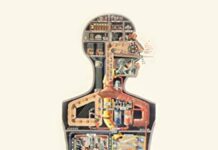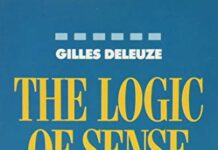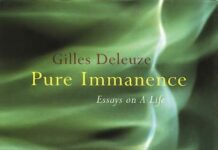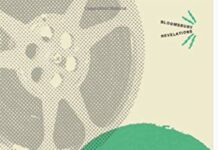
Ebook Info
- Published: 1995
- Number of pages: 350 pages
- Format: PDF
- File Size: 3.03 MB
- Authors: Gilles Deleuze
Description
This brilliant exposition of the critique of identity is a classic in contemporary philosophy and one of Deleuze’s most important works. Of fundamental importance to literary critics and philosophers,Difference and Repetition develops two central concepts―pure difference and complex repetition―and shows how the two concepts are related. While difference implies divergence and decentering, repetition is associated with displacement and disguising. Central in initiating the shift in French thought away from Hegel and Marx toward Nietzsche and Freud, Difference and Repetition moves deftly to establish a fundamental critique of Western metaphysics.
User’s Reviews
Editorial Reviews: Review This is a long-overdue, and skillful, translation of one of Deleuzes most important and original works…It occupies an important place in Deleuzes oeuvre as the first text, following a series of historical commentaries, in which he philosophizes on his own behalf. It occupies an equally important place in the evolution of French philosophy in the 20th century, as it articulates a profound critique of the philosophy of representation while constructing a metaphysics of difference freed from subordination to a logic of identity. While charting the development through the history of philosophy of the concepts of ‘ pure difference and ‘ complex repetition, Deleuze proposes a new image of thought, which readers familiar with his later works will recognize. A difficult and challenging text that has done as much as any to initiate the philosophy of difference that characterizes much recent French thought, this book is one of the classics of recent European philosophy. From the Back Cover Difference and Repetition, a brilliant exposition of the critique of identity, has come to be considered a contemporary classic in philosophy and one of Deleuze’s most original works. About the Author Gilles Deleuze, one of France’s leading philosophers, was Profesor of Philosophy at the University de Paris VIII until his retirement in 1987. His other works include What is Philosophy? andThe Logic of Sense, both published by Columbia University Press. Read more
Reviews from Amazon users which were colected at the time this book was published on the website:
⭐TRUE VERSUS (I)MAGICAL THINKINGTrue Thinking has finally been discovered by philosopher Giles Deleuze as revealed in his original work Difference and Repetition (1968). Hiding behind the illusion of thought promoted by almost all philosophers, and by everyday common sense as well, Deleuze describes in Chapter 3 how to think authentically and philosophically about the universe.Rather than relying on the Cogito of logical thinking and understanding to enable us to grasp the reality of what we sense in the world, true thinking arouses “not a sensible being but the being of the sensible . . . not the given but that by which the given is given.” (p. 140) “That which can only be sensed . . . the being of the sensible, moves the soul, `perplexes’ it–in other words, forces it to pose a problem.”True thinking is aroused by the nomadic and the radical encounter of problems in this world, not by the abstractions of answers and similarities.What is the foundation upon which this revolutionary form of thought rests? Not turtles or elephants or reasons, but: Difference. What Derrida has applied to the world of the text, Deleuze applies to the universe of biopsychical life as well. In so doing he shreds the barriers of both time and space.But what has kept this veil of ignorance over the mind of man throughout time? Fear of the abyss, common sense and a false reliance on “good thought.” Why is this a fearful abyss? If we ground true thinking on the groundlessness of Difference, not sameness or identity, there is no God (who can fully describe god?) there is no Self (who can fully describe a self?) there is no Universe (who can fully describe the universe?) That tends to make most people nervous when you realize the implications. There is fundamentally the encounter with the being of the sensible, the problematic, the creative, the nomadic, the chaotic.FOUR POSTULATES OF ERRONEOUS THINKING (Chapter 3)Dogmatic Representational ThinkingTraditional thinking such as for Kant, mistakes representational thinking for thinking itself–asserting that the representation is the “dogmatic” entirety of thought. Deleuze here presents eight postulates of erroneous thinking, the first four are subjective errors (what we all know), and the last four are based on objective errors (presuppositions based on propositions, or logical assertions)Deleuze’s First PostulateStates that based on `the principle of the Cogitatio natura universalis’, we are all born with a capacity to think and that once this capacity is actualized it naturally wants the truth or has a natural orientation towards the true.Subjective presuppositions are what we all know, the collective we, what everyone understands (see Caputo, Lecture 7). Philosophy presupposes that there is something that we all understand, a consensus we can reach and agree upon. The task of philosophy is recognition, because there is a cogito that we all have, given to us by nature. That nature is good, moral and upright.Good Will as Truth:Illusion of Representational Thought. Thinking has a natural talent for truth “under the double aspect of a good will on the part of the thinker and an upright nature on the part of thought.” (p. 131) As in Bob Marley’s song, “Don’t Worry,” just trust in thinking and in its good nature and all will be good. Everyone knows that thinking results in truth and in moral goodness.The task of philosophy is then to bring what we understand implicitly (pre-conceptually, pre-ontologically) to explicit comprehension (the hermeneutical circle of Heidigger). This is re-presentational thinking of the image of thought. Recognitional thought is radically conservative, about the familiar–and rejects the unrecognizable-deals only with the world that is already constituted, at the expense of the constituting, the created rather than the creative.Ill Will as Truth:The only way to break free of this good will and representational thinking is to have the strength of ill will, untimeliness, destructiveness, demoralization and the paradoxical (Nietzsche’s beyond good and evil and genealogy of morals), based on radical, nomadic thinking.Deleuze’s Second Postulate`The ideal of commons sense’, says that thought in general functions harmoniously. All of the various faculties–sensibility, imagination, memory and thought all work together in their attempt to explicate the object.Sense:”Common sense provides us with the formal nature of a unified subject to which objects correspond. Good sense on the contrary is how we actually carve up the world. ” “Common sense forces an understanding of the world in terms of unified subjects, whose faculties are in (or can at least can be brought into) accord with one another, and recognition posits a world of objects as a correlate of the unified view of the subject.” (pp 107,108, Sommers-Hall)”Common” in the common sense comes from the harmony of the faculties to produce a common object. Common sense is the pure transcendental unity of apperception in Kant or the Cogito in Descartes or the Soul in Plato, the pure self directed at a pure object which supplies the unity of the object and the harmony of the faculties. Good sense is the empirical self directed at empirical objects that supply the given contents that common sense requires. Good sense has to do with the specific contributions of the individual faculties. Common sense is the form of unity. Common sense and Good sense together form the doxa or public opinion.What Deleuze is exposing is that transcendental conceptualization is nothing more than taking the empirical of good sense and declaring that there is some magical transcendental knowing and unification of the object and faculties through common sense that is nothing more than the empirical object and a multiplicity of faculties. Transcendental knowing and unity are illusions of philosophy, especially as developed by Kant and Husserl. Deleuze has a generative view of the transcendental which is not grounded in the cognitive, but in the sensible. (see Caputo, Lecture 7)Deleuze’s Third PostulateThe model of recognition’ is the objective correlate to `common sense’. Instead of finding unity in the harmonious exercise of the faculties, the unity now lies in the object: the object is supposed the same for each faculty: sensibility, imagination, memory and thought all confront one and the same object.The Model (form) of recognition (of the possible) may contain errors within it’s domain of knowledge which need to be corrected, the Model itself can not be questioned. The form of recognition sanctions only the recognizable, never the unrecognizable, the impossible, the beyond-the-known. Philosophy submits itself to the banal, instead of being nomadic, adventurous and open to the creative.Deleuze believes that Kant and Plato discovered breakthrough, radical concepts regarding the sensible and the ideal, the empirical and the transcendental. The ideal of Plato is what breaks us free from the senses to escape the cave. However Plato fell back into the cave by clinging to the forms of recognition, like Kant who revealed the empirical ego and then fell back into the transcendental forms of recognition (TUA).”Kant traces the so-called transcendental structures from the empirical acts of a psychological consciousness: the transcendental synthesis of apprehension is directly induced from an empirical apprehension, and so on. In order to hide this all too obvious procedure, Kant suppressed this text in the second edition. Although it is better hidden, the tracing method, with all its `psychologism’, nevertheless subsists.” (p. 135) It is this Kantian `psychologism’ which Deleuze will employ to develop his metaphysics.Deleuze makes use of Kant’s exposition of the transcendental illusion, that one of the natural outcomes of reason is that it naturally results, not simply in error, but in illusion. Because our understanding includes unrecognized sensibilities (reason operating without reference to intuition), we therefore come to false understandings which Kant called illusions. Deleuze’s solution is to renounce the image of thought (model of recognition) and instead embrace radical thinking: thinking without method, thinking without image, thinking on its own, thinking faced with a singularity which is unprecedented.Deleuze’s Fourth Postulate”The element of representation’ states that the previous postulates search for the true, the relations among the faculties, and the relation of the faculties to the object, all within the `element of representation’ as opposed to the paradoxical elements that do not behave.Again, he is continuing his counter-Kantian argument based on the Critique of Pure Reason, so he argues against the faculty of recognition based on representation–defined as an identity we can conceive of (understanding of concepts), an analogy (distribution of identity) that we can judge (judgment), an opposition or contradiction that we can imagine (imagination, schematized under time) and a similarity that we can perceive(perception)–obvious Kantian faculties paired with Aristotle’s categories of identity, analogy, opposition and similarity. Representation is thus the inability to see difference in itself and repetition for itself.Thinking without ImageSensation divests us of the image of thought with that which is: not recognizable, imponderable, unthinkable, without image, and without the machinery of representational thought. It is in this sensational way alone that we do not think, either as individuals or as a society. As in the becoming of Plato, thought becomes born of a “fundamental encounter” yielding a sign that makes us to think with the force of a problem without answers, without images, and with discord/shock and trauma to the faculties, forcing us to think in new ways with a `superior empiricism,’ with `transcendental empiricism.'”Discord of the faculties, chain of force and fuse along which each confronts its limit, receiving from (or communicating to) the other only a violence which brings it face to face with its own element, as though with its disappearance or perfection” (p. 141).What understanding can I have beyond understanding, what judgment can I have beyond judgment, what can I imagine beyond imagination, what can I perceive beyond perception. And what is the genesis of this knowing? What is its source, pathway and destination? How are my faculties derivative and generative of other faculties? How are these faculties continuously in flux transforming and being transformed? Experimentation, experience and transcendental thinking will reveal (and conceal) the being of the sensible–we shall see (perceive, understand, judge, imagine, beyond perception, beyond understanding, beyond judgment, beyond imagination). Trespass and ViolenceThought must be awakened from its “natural stupor.” “Thought is primarily trespass and violence-the enemy-and nothing presupposes philosophy: everything begins with misosophy” (p. 139) and ill will. What is needed is “the power of a new politics which would overturn the image of thought. Even the dead God and the fractured I are no more than a passing bad moment.” (p. 137)Start with Chapter 3 and make your way through a new view of the universe through the rest of the book.
⭐This book is literally impossible to summarize in an amazon review, and I would be lying if I said I was anywhere near mastering the contents of this work, so rather than trying to summarize it, and failing miserably, I think I will try instead to give a general sense for why I think this book is so important (and I will still probably fail miserably).It is my genuine opinion that Difference and Repetition is the most important work of philosophy written in the twentieth-century (though it should not be read in isolation from the rest of Deleuze’s work or his work with Felix Guattari). I realize that is a controversial statement, and while I do not want to spend my whole review defending that specific claim (this is certainly a very important work of twentieth-century philosophy whether or not I am right about it being the most important) I would like to give some sense for why I think that is the case.Heidegger has been the dominant figure within the Continental tradition of philosophy, at least since the publication of
⭐, but I think Deleuze’s work will ultimately hold up better with time for a number of reasons (Heidegger’s anti-realism and ambivalent attitude towards science are near the top of the list). Heidegger attempted a radical deconstruction of the history of Western philosophy in an effort to work out a fundamentally new beginning (or at least open the possibility for an other beginning) for Western philosophy, but I actually think that Deleuze was more successful than Heidegger in his critiques of some of the central “dogmas” of the Western philosophical tradition. The reason I think this is one of, if not the most, important book in twentieth-century philosophy (along with Deleuze’s other works) is precisely because of the radical nature of Deleuze’s philosophy and ontology. Deleuze breaks with some of the standard ontological doctrines and problems that have been the bed rock of Western philosophy, at least since Aristotle (the duality between matter and form, the division of being in terms of genus and specific difference, the notion of essence, non-being conceived as the negative or negation, nominalism versus realism in regard to universals, truth as correspondence, etc.). It would be possible to write an entire history of Western philosophy just in terms of these problems they have been so prevalent.Deleuze, in this book (and his other books) radically rethinks all these problems and is, in my opinion, the first to produce a truly post-Aristotelian ontology (for more on this aspect of Deleuze’s thought I would recommend reading
⭐by Manuel DeLanda, or you could watch DeLanda’s lectures on Deleuze on youtube).Deleuze no longer thinks in terms of matter and form but instead attempts to describe the genesis of form from the intensive properties of matter and virtual multiplicities, which he also calls problematic Ideas. Deleuze’s notion of problematic Ideas also allows him to re-conceive non-being in terms of the problematic, or what he calls ?-being, rather than the negative or negation, and it also allows him to re-conceive thought on the model of learning rather than recognition (one of the most exciting aspects of Deleuze’s philosophy in my opinion). Deleuze’s notion of univocal being and nomadic distribution also breaks with the traditional division of being in terms of genus and specific difference and the hierarchies that implies. Deleuze also works out a new, creative image of thought which challenges the image of thought, and truth as correspondence, that has dominated Western philosophy since its inception, and that re-conception of thought allows Deleuze to rethink the negative of thought in terms of things like madness or stupidity which, in Deleuze’s view, are irreducible to simple error, which has been the standard negative of thought in the Western tradition. These are just a few of the reasons I think this book is so important and philosophically exciting. Even Heidegger’s deconstruction of the Western traditions falls short, in my opinion, of the radically new conception of philosophy, thought, and ontology that Deleuze elaborates in this book and his other works.While this is a very important book it is also one of the most difficult works of philosophy ever written. Deleuze makes absolutely no effort (as far as I can tell) to meet his readers half-way. Deleuze works out a radically new ontology, with radically new terms (virtual multiplicities, dark precursors, problematic Ideas, pure intensities, etc.) without ever stopping to offer clear definitions of his new terms. Deleuze also relies a great deal on analogies from mathematics in elaborating his ontology, so if you are like me, and do not have a strong background in mathematics, it makes it difficult to understand the points Deleuze is trying to make. It is not impossible to understand Deleuze without mathematics but it certainly helps to have some idea of what he is talking about, particularly in regard to calculus (if you have never studied calculus I highly recommend the math lectures by Prof. Rosenthal on iTunes U. Rosenthal has a series of courses, beginning with pre-calculus and finishing with differential equations, that I have found to be exceptionally helpful).Realistically there is simply no way a first time reader will be able to understand this book on a first read through (I have read the early, more accessible, sections of this book three or four times through and they are still difficult for me despite being the more accessible sections of the book).I would offer the first time reader two pieces of advice. First, do not expect to understand everything the first time through. Try to understand just little pieces on a first read through without obsessing over understanding every detail. Cling to those little pieces because the next time you read it through those pieces will help shed light on other little pieces, and so on with each new reading. This book is not for laypeople or tourists. If you do not have A LOT of time to devote to understanding this book (by which I mean years) there is probably little reason to read it at all. That might sound harsh but I think it is true. That means that you should be prepared to read this book many times if you really want to understand it. I would suggest that your goal on a first read through should simply be to identify questions that you have (what is intensity? what are the three syntheses of time? what is the dark precursor? what drives the movement from virtuality to actuality?, etc.). You should not expect to be able to answer those questions after a first read through. It is enough to simply identify them as questions (I admit I am still unable to offer fully satisfactory answers to these questions). But having them as questions will guide your second read through, and it will guide you when attempting to read the secondary literature in search of answers.The second piece of advice I would offer is: read secondaries along with this book. There are two general introductions to Deleuze’s thought I can recommend:
⭐by Claire Colebrook is the most accessible book on Deleuze I have read and will help the reader get a general sense of Deleuze’s philosophy.
⭐by Todd May is another relatively accessible book on Deleuze.When it comes to Difference and Repetition itself there are two commentaries which are fairly good (though neither is perfect in my opinion):
⭐by James Williams and
⭐by Joe Hughes. There is also, apparently, another commentary on the way by Henry Somers-Hall. I read an article by Henry Somers-Hall on Deleuze’s interpretation of the calculus that I thought was quite good so I recommend keeping an eye out for his commentary. I suspect it will be of a very high quality.And finally, the best book on Deleuze in English is, in my opinion,
⭐by Levi Bryant. It is a challenging text in its own right and probably should not be the first book you read on Deleuze but it is the best book there is if you are truly interested in understanding Deleuze as a serious philosopher. Deleuze has a reputation for being a kind of Nietzschean affirmer of becoming with little philosophical rigor to back up his preferences for difference, multiplicity, chaos, becoming, etc. over identity, unity, order, and being, but nothing could be further from the truth. Gilles Deleuze is one of the most rigorous thinkers within the Continental tradition (ultimately you simply do not achieve the status that Deleuze has achieved if you are not a rigorous thinker) and Levi Bryant does a truly superb job at presenting Deleuze as a serious and rigorous philosopher. I really cannot praise his book enough.I will be updating my list of helpful secondaries as I make my way through more of the literature on Deleuze. Good luck!
⭐Gilles Deleuze one of the key figures in poststructuralism, and one of the most influential philosophers of the twentieth century. The book articulates a profound critique of the philosophy of representation while constructing a metaphysics of difference freed from subordination to a logic of identity. While charting the development through the history of philosophy of the concepts of ‘ pure difference and ‘ complex repetition, Deleuze proposes a new image of thought, which readers familiar with his later works will recognise. A difficult and challenging text that has done as much as any to initiate the philosophy of difference that characterizes much recent French thought, this book is one of the classics of recent European philosophy.
⭐This book is from Deleuze’s doctoral dissertation. It makes a great reference book for anyone who needs to work and think about ontology and conceptualization. It forms much of the thought basics for his later works..an absolute must…
⭐It is unfortunately not print but copy edition. If some lines are being smaller when you are reading. It’s not nice you know. I didn’t think it will be like this. I thought that it will come as printed edition, that is real book.
⭐Excellent
⭐Amazing book! Love Deleuze!
Keywords
Free Download Difference and Repetition in PDF format
Difference and Repetition PDF Free Download
Download Difference and Repetition 1995 PDF Free
Difference and Repetition 1995 PDF Free Download
Download Difference and Repetition PDF
Free Download Ebook Difference and Repetition





